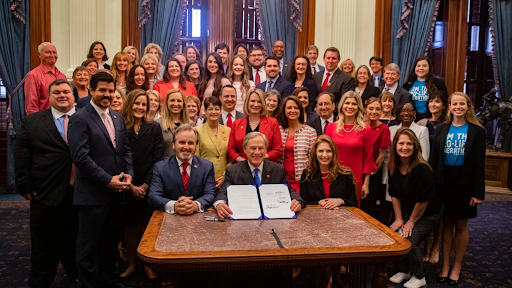Texas’ Heartbeat Bill to SCOTUS: A Brief Breakdown of the DOJ’s Case Against S.B. 8

Image Courtesy of CBS DFW
By Eva Lynch
One of Texas’ most controversial Senate bills to date, S.B. 8, colloquially called a heartbeat bill, came into effect on Wednesday, September 1. A little over a week later, President Joe Biden’s Department of Justice submitted a case against the law to the Supreme Court, calling it unconstitutional, as announced by US Attorney General Merrick Garland.
The initial complaint, US v. State of Texas, is over 25 pages long and cites several landmark yet increasingly controversial Supreme Court precedents, including Roe v. Wade. Ultimately, the DOJ requested a declaration from the Court voiding S.B. 8, an injunction from the Court against the state of Texas, “including all of its officers, employees, and agents, including private parties who would bring suit under S.B. 8,” prohibiting the enforcement of S.B. 8, and any other action necessary to strike down the state legislation.
The complaint cites several points where the bill contradicts the Constitution, including its deputization of citizens to act in ways contrary to the Constitution, its unique structure—specifically Texas lawmakers’ admittance of their intent to subvert judicial review—and the law’s contradiction of the Fourteenth Amendment.
As written, S.B. 8 prohibits state actors—which includes lawmakers, state officials, and police officers—from enforcing the abortion ban enacted by the bill. Instead, the bill purports to award any private citizen “an amount of not less than $10,000” for turning in any individual that receives an abortion or intends to get one, as well as any individual found guilty of aiding and abetting an individual’s reception of the procedure, including anyone involved in performing the procedure, helping to transport the individual to the procedure, or any other aspect of the abortion. US v. Texas calls the promise of $10,000 “deputiz[ing] ordinary citizens to serve as bounty hunters,” made worse by the offering of monetary compensation.
The complaint alleges that, while this offering of bounty for finding and turning in individuals seeking an abortion does not directly contradict the Constitution, it intends to “make it too risky for an abortion clinic to operate in the State, thereby preventing women throughout Texas from exercising their constitutional rights.” Further, states are constitutionally allowed to make their citizens function as state actors, but in doing so must recognize that this new function binds citizens by the Constitution. This connection is made more clear when considered in conjunction with public comments by Texas officials confirming the bill’s intent to undermine judicial review (i.e. to prevent the bill from being contestable in court).
S.B. 8’s alleged deputization of private citizens represents a deviation from other states’ heartbeat bills in the past; Texas lawmakers have not tried to hide the fact that these distinctions were purposeful and intended to make the bill as judicially foolproof as possible, according to sources included in US v. Texas. The DOJ’s complaint cites several public comments by Texas politicians about the bill’s attempted anti-justiciability as part of the bill’s unconstitutionality.
“And Senator Bryan Hughes, one of the principal architects of S.B. 8 in the Texas Legislature, removed all doubt about this purpose when he informed reporters that S.B. 8’s structure was intended to avoid the fate of other ‘heartbeat’ bills that have been struck down as unconstitutional,” the bill says.
The case cites all of these points as violations of the Fourteenth Amendment, the relevant parts of which prevent states from enacting or enforcing legislation which “abridge[s] the privileges or immunities of citizens of the United States,” as well as protect citizens’ “life, liberty, and property” under due process of law.
The mention and use of the Fourteenth Amendment is an interesting one, as the clause therein that refers to protecting life, liberty, and property has long been used by the pro-life movement as the basis for the unconstitutionality of abortion.
While the manner in which the law is to be enforced is definitely a point of contention, US v. Texas includes an analysis of the content of the law that refers to the actual ban on abortions. The original bill prohibits abortions after the first six weeks of pregnancy, with little room for exemptions based on rape and incest, although there are exceptions allowed for medical emergencies, should a medical professional deem it necessary.
A large chunk of the DOJ’s case focuses on the six-week stipulation, and specifically its association with the viability of a fetus, citing circuit-court precedent in a still-pending case, Dobbs v. Jackson Women’s Health Organization, wherein the lower court decided that “cardiac activity can be detected well before the fetus is viable [and] [t]hat dooms the law.” Further, in the 1992 case Planned Parenthood v. Casey, the Court adopted the “undue burden test,” previously established in segregation cases, to analyze whether state government restrictions on abortion access represented an undue burden on the individual attempting to receive an abortion. US v. Texas interprets the six-week timeframe as an undue burden on individuals seeking abortions and therefore as a violation of the Due Process Clause of the Fourteenth Amendment.
Regardless of the ultimate decision, this case will set much important precedent, and it will revisit some previously set precedent by a bench that looks very different than it did at the time of those decisions, due to the breadth and depth of the issues raised. Yes, the decision will make some indication about the longevity of Roe v. Wade, but it will also certainly address more general questions about separation of powers and federalism, two fundamental tenets of the Constitution: Is uniformity across state laws important, and is abortion legislation an integral part of that uniformity? Does the Supreme Court even have the power to strike down a law concerning an issue which has been historically deemed an express power belonging to the states?
Because the DOJ’s case was recently submitted, and we are coming up on a new SCOTUS term beginning in October, it remains unclear when the Court will hear this case. In the meantime, the full case against Texas’ heartbeat bill can be found here.






